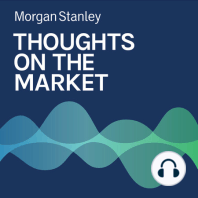4 min listen

Michael Zezas: Signals from the Speaker of the House Vacancy
Michael Zezas: Signals from the Speaker of the House Vacancy
ratings:
Length:
3 minutes
Released:
Oct 11, 2023
Format:
Podcast episode
Description
With Congress still without a Speaker of the House, investors should keep an eye on the impact that another potential government shutdown would have on the markets.----- Transcript -----Welcome to Thoughts on the Market. I'm Michael Zezas, Global Head of Fixed Income and Thematic Research for Morgan Stanley. Along with my colleagues bringing you a variety of perspectives, I'll be talking about the impact of Congress on financial markets. It's Wednesday, October 11th, at 10 a.m. in New York. As of this recording, the U.S. House of Representatives still does not have a speaker following Representative McCarthy's ouster a little over a week ago. Republicans are scheduled to meet today to attempt to nominate the speaker, but until one is chosen, it's unclear that Congress can do any other business. But does that actually matter for investors? Here's two signals from these events that we think are important. First, it signals that Congress is unlikely to deliver any substantial legislation between now and the 2024 election outside of funding bills. Republicans' difficulty choosing a speaker reflects their lack of consensus on many policy issues, including regulation, social spending and more. That further impedes the government's ability to legislate, which was already hampered by different parties controlling the White House and Congress. So for investors who have credited the rise in bond yields and stock prices to expanded fiscal support from the federal government in recent years, you shouldn't expect there to be more on the horizon. The exception to this could be an economic crisis that prompts a fiscal response. But for investors, that means you'd likely see bonds rally and stocks sell off before fiscal support would again become a stock market positive. The second signal, which also cuts against the narrative of government policy support for markets, is that a government shutdown is still a distinct possibility. Congress recently avoided the government shutdown at the beginning of the month by passing a temporary extension of funding into November. But that move only delayed the resolution of key policy disagreements within the House Republican caucus that nearly led to the shutdown in the first place. With the clock ticking toward another shutdown deadline, Republicans are spending precious time selecting a new speaker, and it's not clear they're any closer to resolving their disagreements on key issues such as funding aid to Ukraine. Without that resolution, the risk remains that the House could fail to consider funding bills in time to avoid another shutdown. Now, to put it in context, our economists expect that downward growth pressures from a shutdown event should be modest, and so there are more meaningful factors to consider for markets out there, but certainly this condition doesn't help investors' confidence in the U.S. growth trajectory. And generally speaking, a Congress stunted in its ability to legislate has the potential to become a bigger challenge, particularly if geopolitical events create greater global growth risks. So bottom line, this situation is worth keeping tabs on, but isn't yet something we think should principally drive investors decision making. Thanks for listening. If you enjoy the show, please share Thoughts on the Market with a friend or colleague or leave us a review on Apple Podcasts. It helps more people find the show.
Released:
Oct 11, 2023
Format:
Podcast episode
Titles in the series (100)
Andrew Sheets: A Second (and Third) Opinion for Equity Markets by Thoughts on the Market